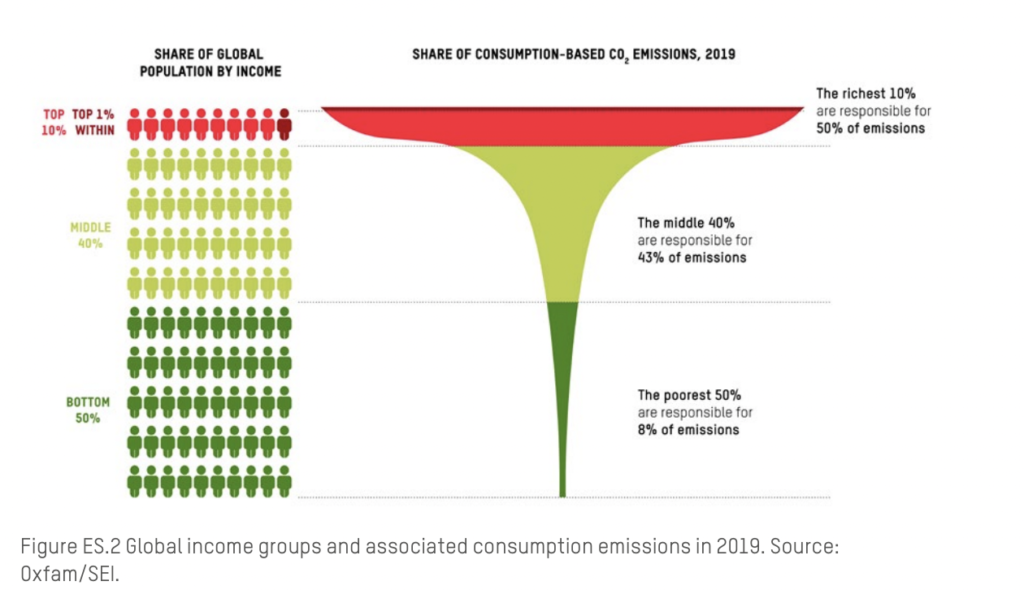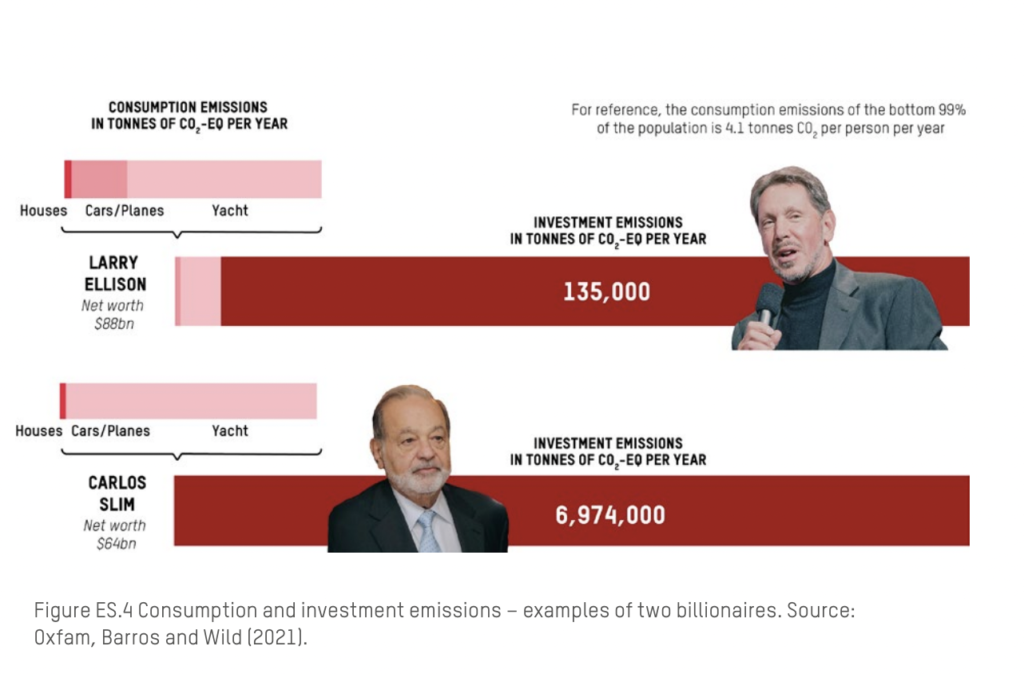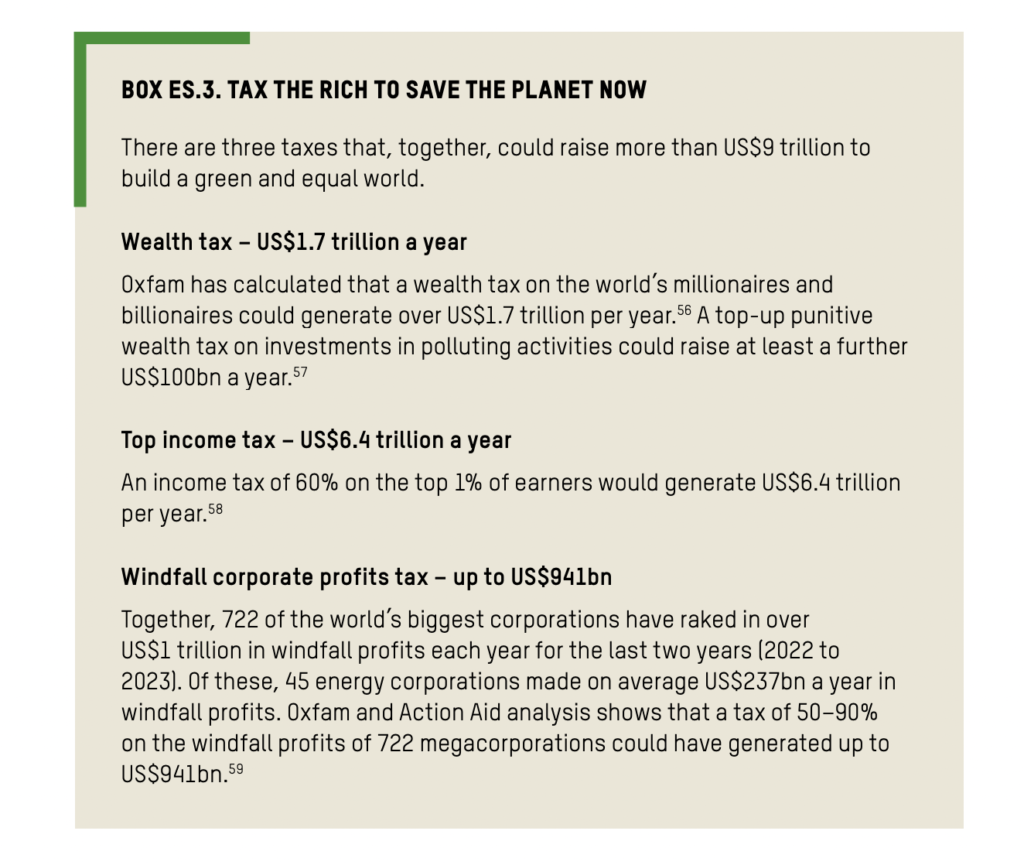A dramatic new report from Oxfam, the international anti-poverty group, lays out in the clearest possible terms that climate change is directly linked to economic inequality–and the only high taxes on the income and wealth of the very rich can save the planet.
You can download the entire 106-page report here, or look at a summary here.
The research is detailed and solid. The UK Guardian has a good story on it here.
But even the Guardian doesn’t focus on what I think is the most important part of the report: It’s conclusion that governments have to act to reduce economic inequality not by “growth” or job training or popular (but limited) anti-poverty programs but by taking money and wealth away from the top 1 percent.
In other words, there is no such thing as an effective climate plan that isn’t also an economic equality plan—one that starts with high taxes on the rich.

That, I think it’s fair to say, is not likely to be at the top of the agenda when world leaders meet at the upcoming climate summit in Dubai, which has some of the worse economic inequality in the world.
It’s never at the top of the agenda in San Francisco, or the state of California, when Mayor London Breed and Governor Gavin Newsom present their climate plans. It’s not even discussed seriously at the federal level, except in the occasional hearing called by Sen. Bernie Sanders.
I remember once years ago asking Al Gore, who was running for president, about economic inequality, and the man who would go on to win a Nobel prize for his work on climate change said: “I think taxes are high enough already.”
The report comes at a time when economist are starting to notice that the level of greed at the top is not only alarming, it’s historically unprecedented. From a recent New York Times oped by economic historian Guido Alfani:
There is abundant historical evidence that for centuries, across the West, the rich have dutifully fulfilled their role of “barns of money” in a variety of ways, which included accepting to pay exceptional taxes during crises or to provide loans to governments.
Today, however, “the rich have stopped fulfilling the social role that has been their own for many centuries, making their position in society somewhat unclear.”

The Oxfam report, prepared with help from the Stockholm Environment Institute and a professor at Dartmouth College, takes direct aim at neoliberal Capitalism and its assumptions of the importance of continued growth in global consumption:
The flawed neoliberal economic model that has aggravated extreme inequality and extreme wealth goes a long way towards explaining these worrying trends. The model prioritizes the endless pursuit of growth at all costs, requires increasing levels of consumption to function and puts profit for the few before a sustainable future for the many. It thrives on the overconsumption of the rich and on irresponsible investments from the super-rich, both of which drive unsustainable carbon emissions.
It notes that the carbon emissions of the 1 percent are as high as the emissions of the bottom 66 percent, or 5 billion people. The current consumption and investment patterns of the 1 percent cancel out every year the impact of 1 million wind turbines.
From the report:
Presenting new research, this report shows that these twin crises of climate and inequality are instead interlaced, fused together and driving one another. Drawing on new global data and experts and advocates the world over, this report argues for a radical new approach if we are to stand any chance at overcoming the catastrophe unfolding before us. It argues for a planet for the 99%, in which we address extreme inequality and climate breakdown together. This means addressing not just the historic and current responsibilities of high-emitting nations and major corporations for their role in driving carbon emissions, but also – critically – the disproportionate role that the richest individuals play in the climate crisis through their emissions, investments and capture of politics. It means a recognition that a radical increase in equality is a precondition to ending climate breakdown.
From one of the contributors, Njoki Njehu, Pan-Africa regional coordinator for the Fight Inequality Alliance:
I believe, now more than ever, that the rich and the powerful in our world fear the end of capitalism – their power and privilege – more than they fear the end of our beautiful, precious planet. They have known for decades that the fight against inequality and the fight to stop climate breakdown are the same struggle. That stopping climate breakdown means an end to the economic system that has served them so well for so long. That is why they resist in every way they can. Why they continue to pollute our air, poison our seas, and push us over the edge of planetary destruction.
Among the recommendations:
We must implement a new wave of taxes on the corporations and billionaires who have profited from plundering our world. trillions of dollars from these new taxes can be invested in public services, technologies and goods that are designed for and by the 99%, focused particularly on women and girls, racialized people and other groups who are most impacted. These actions will rapidly build a fairer, greener world, including the provision of universal and accessible renewable energy, energy-efficient safe housing, high-speed rail and other public transport, protection for all against extreme weather, and support for losses and damages already incurred. ….
A 60 percent tax on the incomes of the richest 1 percent would cut emissions by more than the total emissions of the UK and raise $6.4 trillion a year to pay for the transition away from fossil fuels to renewable energy.

Conversely, if current levels of inequality remain unchanged, to raise everyone on earth to the minimum of US $25 per day would require all incomes, including those of the richest, to grow by 50 times, which would destroy our planet.
This is profoundly important information, and it ought to be at the forefront of the climate debate. The Washington Post did a story, but I haven’t seen it in the New York Times or the SF Chronicle.
It will be interesting to see if Breed or Newsom, or any of the candidates for US Senate, will even mention it, since other than Rep. Barbara Lee, none of them have been talking much at all about taxing the rich.
But it’s clear that this isn’t just a progressive agenda item: It’s absolutely necessary for the survival of the human race.






